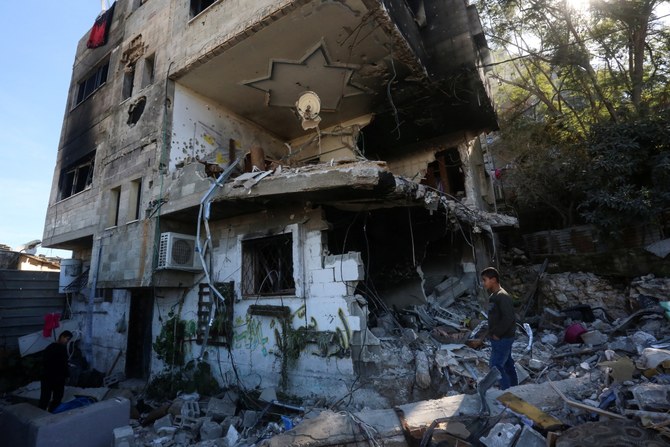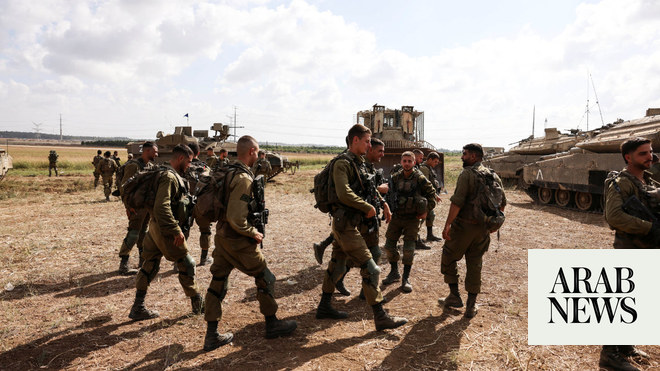
If in doubt, escalate. This may as well be the motto for Israeli Prime Minister Benjamin Netanyahu since Oct. 7. This is a man for whom “total victory” equals total destruction and for whom peace may mean prison. Bibi knows the polls. He knows that the knives are sharpened and at the ready; that the ides of March are fast approaching for this Israeli Caesar.
Until that day of reckoning, when everyone expects him to be unceremoniously ousted from his residence in Balfour Street, Netanyahu feels he has no choice but to go all in. The likelihood is that he will not hesitate to order a full-scale ground invasion of Rafah in the coming days. He is prepared to risk Israel’s relations with the US, with regional partners and even Israeli security for this end. In this, it must be remembered that he has the backing of many mainstream Israeli politicians, including his likely successor Benny Gantz. Many Israelis, including many of the families of the 134 remaining hostages, believe Netanyahu has sacrificed them in the cause of his own political survival.
If the above analysis is broadly accurate, Netanyahu has a massive problem when some form of calm descends on what remains of Gaza. When Rafah is flattened, with no doubt the percentage of destroyed and damaged buildings in Gaza heading more in the direction of 80 percent from its current 60 percent, major Israeli operations will inevitably be scaled back. Even for Netanyahu, dropping expensive bombs on rubble makes little sense.
The assumption must be that the medium-intensity conflict with Hezbollah is not one that the Israeli government wishes to escalate. The risks to all are just too high, too punitive.
This leaves the West Bank, including Jerusalem. Here, Netanyahu can secure the full backing of his coalition and the ever more powerful settler movement for a major onslaught, up from the mid-level variety currently in play.
Even for all those in Israel who have pushed for the recolonization of the Gaza Strip, the West Bank is indisputably the big prize
Chris Doyle
Remember that, even for all those in Israel who have pushed for the recolonization of the Gaza Strip, the West Bank is indisputably the big prize. The settlers have been busily pushing Palestinians off their lands in Area C, which makes up some 62 percent of the West Bank — another process of ethnic cleansing alongside the massive process in Gaza. As the Israeli group Peace Now has reported, 2023 was, “for the settlement enterprise, probably the best year since the Oslo Accords,” with record numbers of units advanced. Some 26 new outposts were established and 21 Palestinian communities forced from their homes.
But if there was to be a major Israeli military operation akin to Operation Defensive Shield in 2002, the settlers would expect far more territorial plunder. Various areas would be in their sights. In the South Hebron Hills, the settlers see a job to be completed. East of Ramallah has also been a target zone. In the Jordan Valley, 20 Palestinian families had been kicked off their lands by mid-December last year. Israeli soldiers have denied Palestinians access to water as another way to force them off their land.
Thousands of settlers have been armed, given military uniforms and incorporated into “regional defense” battalions. Many of these settlers have a proven track record of violence against Palestinians.
Once an area is “sterilized” — an official term meaning that it is free of Palestinians — the settlers will establish a raft of new outposts to formalize the theft of land.
The Palestinians in the West Bank have already been softened up. Israeli armed forces have been targeting much of the north, including invading refugee camps in Jenin, Tulkarem and Nablus.
Since Oct. 7, the Palestinian economy in the West Bank has been squeezed ruthlessly by the Israeli authorities. Palestinians have not been able to work in Israel or in settlements. Draconian restrictions on movement have likewise served to cripple economic activity. Last October, half of Palestinian farmers were unable to harvest their olives as a result of Israeli restrictions, according to estimates by the Palestinian Farmers’ Union. The Israeli measures have included blocking the entrances to numerous Palestinian villages, immiserating the lives of hundreds of thousands of Palestinians. These are the most intense and devastating series of closures since the height of the Second Intifada. All of this is exacerbated by Israel holding on to Palestinian customs revenues.
Netanyahu will wink at the settler extremists, who know all too well how to provoke their Palestinian neighbors
Chris Doyle
How will all of this be ignited? The fast-track option for Netanyahu is Jerusalem. This is the tried and tested way to set the West Bank on fire. Ramadan is approaching. Tensions in the Old City will rise, as ever. This may well be the time for Netanyahu to foment the explosion. He has done so before. In some ways, it would be the reverse of 2014, when Jerusalem got out of control and Netanyahu turned to invading Gaza. This time, smashing up Jerusalem may follow Gaza.
The radioactive core of this will be Al-Aqsa. Any actions or even rumors of actions to change the status quo there typically leads to a Palestinian reaction. Netanyahu will wink at the settler extremists, who know all too well how to provoke their Palestinian neighbors.
The other old city that could be set alight is in Hebron. This is home to some of the most violent extremist settlers, the ideological brethren of Israeli National Security Minister Itamar Ben-Gvir. They also see an opportunity to eject the Palestinians from the center of this ancient Palestinian city.
Ben-Gvir can sense an opportunity to foment discord. “We should not allow residents from the (Palestinian) Authority to enter Israel in any way” during Ramadan, he said. “We cannot take chances and risks … It can’t be that women and children are hostages in Gaza and we allow Hamas victory celebrations on the Temple Mount.” Israeli media reports suggest Netanyahu agrees with him. Hundreds of thousands of Palestinians worship at Al-Aqsa during Ramadan. In recent years, this month has been particularly fraught.
All this is massively dangerous, including for Israel. Inflaming the West Bank and violating Al-Aqsa could tip the whole region to the upper levels of conflict. How will Hezbollah react, let alone other groups?
Can anything or anyone stop Netanyahu taking the region onto this perilous roller coaster ride? The answer is yes, but the signs that this will happen are slim. His Israeli opponents have not kicked him out. President Joe Biden has all the tools, all the levers. The questions are about his motivation and will. As yet, both have been found wanting. So, do not be surprised when the carnage shifts from Gaza to the West Bank. Netanyahu needs a forever war and he knows how to deliver.
Chris Doyle is director of the Council for Arab-British Understanding in London. X: @Doylech












